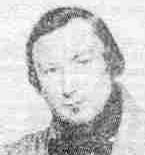Ar butuner
Texte recueilli par Jean-Marie de Penguern (1807 - 1856)
Auprès de Catherine Le Borgne de Laninor en Taulé, le 3 mars 1851.Manuscrit coté N.90 à la Bibliothèque Nationale : Chants populaires de Léon
Publié par Dastum dans "Dastumad Penwern" en 1983, page 52

Mélodie
(Gavotte "Dañs An hini vras" - Penguern n'indique pas de mélodie)
Arrangement par Christian Souchon (c) 2009
|
AR BUTUNER E fin ebrel, e komansamant mae, Un dervezh e oa gañti labourer diouzh an deiz Hag hi mond da lavared kazi en ur ger berr : „Biken, jamez, emezhi n’em-bez ur butuner“. An den-mañ a oa den a spered. Ne lavar ger e-bed: Ned’eo den d’en em damall, nemed kiriek e ve. Hag en ur pennad goude int en em rankontret Ar plac’h a houlen outañ e pelec’h oa chomet. - Da betra, emezañ, ez in d’ho kweled d’ho ti Pa ned’eoc’h kontant d’am gweled o fumiñ? - Mar am-eus lavaret me a c’houlen pardon Me zo kontant e fumoc’h deus-a kreiz va c’halon. - Salhokras, plac’h yaouank, ho trugarekaad Ar gomzoù a lavarit a blij d’am daoulagad. Me am-eus arc’hant awalc’h evit kaout butun. A-drugarez va Doue, ne renkin ket yun. Pa ‘z an-me d’ar marc’hajoù gant va marc’hadourezh, Me zo sur eus va vara ha kig fresk aliez Hag un nebeud dinered da zont ganin d’ar gêr O c’haviñ da implijañ dre m’am-bezo afer. Fached va mestrez ouzhin abalamour ma fuman. Mond en nos da c’hoariñ c’hartoù, ha war an deiz da evañ. Transcription KLT: Chr.Souchon (c) 2009 |
LE FUMEUR C’était à fin avril, peut-être début mai, Elle avait pris un ouvrier pour la journée. Elle lui déclara de fort mauvaise humeur: « Jamais, au grand jamais, je ne prends de fumeur». Il ne répondit rien et c'était raisonnable. Personne ne s’accuse à moins d’être coupable. Et quelque temps après, ils se sont rencontrés. La fille lui demande où donc il est passé. - A quoi bon, lui dit-il, venir vous déranger, Si vous ne supportez pas de me voir fumer ? - J’en demande pardon, si c’est ce que j’ai dit. Vous fumez ? Mais, j’en suis bien aise, Dieu merci! C'est moi qui vous sais gré, jeune dame au coeur tendre, De ces paroles qui font plaisir à entendre. Pour avoir du tabac j’ai de l’argent assez, Et, grâce à Dieu, n’en suis pas réduit à jeûner. Quand je vais au marché pour vendre mes produits, Le pain m’est assuré, souvent la viande aussi. Si je mets de côté quelques deniers parfois, Savoir ce que j'en fais ne regarde que moi : - Soit, chez moi, nuit et jour, enfumer mon amie, Soit être au jeu la nuit, le jour aux beuveries. Trad. Christian Souchon (c) 2009 |
THE SMOKER By the end of April, maybe early in May, She hired a labourer who was paid by the day. Soon she pounced on him and she told him in one go “Never did a smoker at work make a good show”. He did not breathe a word and proved to be witty. Who does accuse himself unless he is guilty? And a short time later they encountered again. She asked him why he had left her waiting in vain. - What is the use of my visiting you, said he, If smoking is a thing you are not pleased to see. - Did I say so? My remark was out of season. Why should I object to your smoking? No reason! - I'm so glad to hear you say so, my young lady! These words of yours, they please my ears definitely! I've money enough to pay for my tobacco And, thanks be to God, without food I mustn’t go. To the markets I go and there I sell my goods, Afford my bread always, fresh meat often I could. When I come home some pence in my purse still abide. And how I employ them is easy to decide: - Either I do annoy sweetheart with my smoking Or I spend my nights playing cards, my days drinking. Transl. Christian Souchon (c) 2009 |
